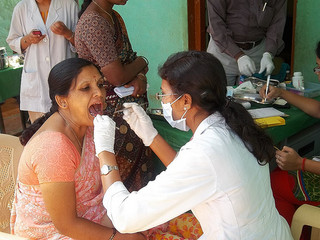November 20, 2012 -- Oregon’s new coordinated care organizations should make important public health goals such as reducing diabetes and obesity top priorities, but they must realize that culturally appropriate care is essential if their messages are to be heard, a top public health official told The Lund Report.
 Lillian Shirley, the Multnomah County Health Department Director, in an interview noted that all potential CCOs had to submit a cultural competency plan as part of their approval process. Health Share of Oregon, the tri-county CCO, used Multnomah County’s cultural competency plan when it applied for CCO status, she said.
Lillian Shirley, the Multnomah County Health Department Director, in an interview noted that all potential CCOs had to submit a cultural competency plan as part of their approval process. Health Share of Oregon, the tri-county CCO, used Multnomah County’s cultural competency plan when it applied for CCO status, she said.
Understanding where a patient is coming from culturally is critical because otherwise providers may not get important clues, and this could lead to incorrect and potentially expensive treatment plans, she said.
Shirley recalled a family she met early in her public health career. The family routinely filled a needed prescription and kept it on the top of the refrigerator – but after symptoms disappeared the medicine was no longer taken.
They classified things culturally as “hot or cold” and without symptoms the family decided that the problem was cold and medicine was no longer needed, she said.
“The key is finding out what something means for the client and asking the question before you assume something.”
Shirley says new workers in her department each receive a copy of “The Spirit Catches You and Then You Fall Down,” a book about Hmong culture and the difficulties of adapting to American culture.
Understanding the cultural context can prevent costly mistakes, she noted, citing a provider in East County who was concerned about a diabetic patient whose labs were out of whack. The provider was all set to order expensive tests but before doing so she met and talked with the patient – only to learn that the woman hadn’t been taking her diabetes medication because her hours at work were cut and she could no longer afford the syringes.
But, not everyone agrees that cultural competency is important. During this year’s legislative session, a Senate bill failed that would have required the Oregon Health Authority and 18 health professional regulatory boards to develop protocols for providing culturally competent care to many minority and ethnic groups.
Senate Bill 97 was rejected by the House in May even though the Legislative Fiscal Office found its impact on the budget to be minimal. Rep. Tim Freeman (R-Roseburg) said the bill was unnecessary. “There’s nothing keeping this from being done now. We don’t need a law to do these things.” Democrats urged its passage.
Overall, tri-county public health leaders agree that they can provide the structure and support for CCOs, but the two have distinct roles in community health that neither can replicate, interviews with area leaders showed.
“We’re focused on population, not on individual health,” said Marti Franc, Public Health Services Manager in Clackamas County.
Kathleen O’Leary, the public health division manager in Washington County, echoing the others, said public health priorities, including tobacco and obesity prevention, are definitely areas that the CCOs need to focus on. She said a challenge is going to be how the organizations can make changes quickly enough to reduce costs.
Franc said she’s not expecting the CCOs to make major announcements on the public health front as the organizations just got off and running this summer and are preoccupied with establishing themselves and setting up administrative systems.
“They have so much work to do – I don’t think public health is a top priority in the beginning stages,” she said, adding that she has no idea when this beginning phase will be over.
“The work in putting these things together is huge. It is a restructuring of the health care system. I think it’s going to evolve gradually and over time. I think they’re interested in public health now and we’re engaged with them in many ways. I think a true partnership and a true level of collaboration is always down the road.”
But, none of the tri-county public health leaders think public health will get the shaft once the CCOs are fully operational.
“I think we will be at the table,” Franc said. “I think the Oregon Health Authority understands the importance of public health…I expect a lot more collaboration over time. “
Image for this story by Trinity Care Foundation (CC BY-NC-ND 2.0) via Flickr.